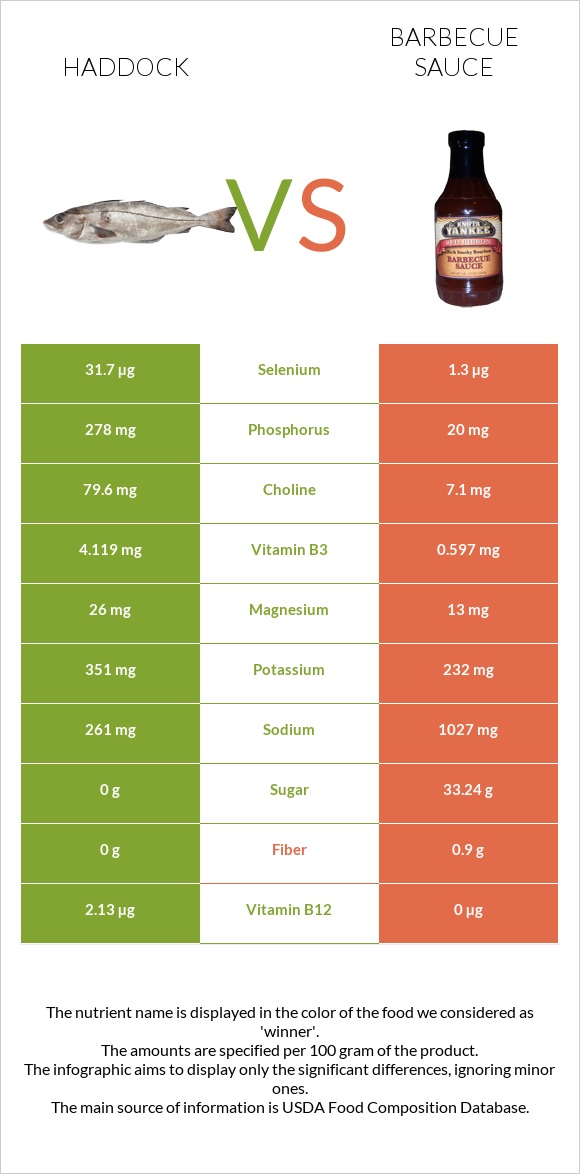Haddock vs. Barbecue sauce — In-Depth Nutrition Comparison
Compare
The main differences between haddock and barbecue sauce
- Haddock has more vitamin B12, selenium, phosphorus, vitamin B3, vitamin B6, choline, and vitamin B5; however, barbecue sauce has more iron.
- Daily need coverage for vitamin B12 for haddock is 89% higher.
Food types used in this article are Fish, haddock, cooked, dry heat and Sauce, barbecue.
Infographic

Infographic link
Mineral Comparison
Mineral comparison score is based on the number of minerals by which one or the other food is richer. The "coverage" charts below show how much of the daily needs can be covered by 300 grams of the food.
| Contains more MagnesiumMagnesium | +100% |
| Contains more PotassiumPotassium | +51.3% |
| Contains more ZincZinc | +135.3% |
| Contains more PhosphorusPhosphorus | +1290% |
| Contains less SodiumSodium | -74.6% |
| Contains more SeleniumSelenium | +2338.5% |
| Contains more CalciumCalcium | +135.7% |
| Contains more IronIron | +204.8% |
| Contains more CopperCopper | +176.9% |
| Contains more ManganeseManganese | +869.2% |
Vitamin Comparison
Vitamin comparison score is based on the number of vitamins by which one or the other food is richer. The "coverage" charts below show how much of the daily needs can be covered by 300 grams of the food.
| Contains more Vitamin AVitamin A | +90.9% |
| Contains more Vitamin DVitamin D | +∞% |
| Contains more Vitamin B2Vitamin B2 | +23.2% |
| Contains more Vitamin B3Vitamin B3 | +589.9% |
| Contains more Vitamin B5Vitamin B5 | +201.2% |
| Contains more Vitamin B6Vitamin B6 | +336% |
| Contains more Vitamin B12Vitamin B12 | +∞% |
| Contains more FolateFolate | +550% |
| Contains more Vitamin CVitamin C | +∞% |
| Contains more Vitamin EVitamin E | +45.5% |
| Contains more Vitamin KVitamin K | +1700% |
All nutrients comparison - raw data values
| Nutrient |  |
 |
DV% diff. |
| Vitamin B12 | 2.13µg | 0µg | 89% |
| Selenium | 31.7µg | 1.3µg | 55% |
| Protein | 19.99g | 0.82g | 38% |
| Phosphorus | 278mg | 20mg | 37% |
| Sodium | 261mg | 1027mg | 33% |
| Cholesterol | 66mg | 0mg | 22% |
| Vitamin B3 | 4.119mg | 0.597mg | 22% |
| Vitamin B6 | 0.327mg | 0.075mg | 19% |
| Fructose | 14.17g | 18% | |
| Carbs | 0g | 40.77g | 14% |
| Choline | 79.6mg | 7.1mg | 13% |
| Vitamin B5 | 0.494mg | 0.164mg | 7% |
| Iron | 0.21mg | 0.64mg | 5% |
| Copper | 0.026mg | 0.072mg | 5% |
| Manganese | 0.013mg | 0.126mg | 5% |
| Calories | 90kcal | 172kcal | 4% |
| Potassium | 351mg | 232mg | 4% |
| Fiber | 0g | 0.9g | 4% |
| Vitamin D | 23 IU | 0 IU | 3% |
| Magnesium | 26mg | 13mg | 3% |
| Vitamin D | 0.6µg | 0µg | 3% |
| Folate | 13µg | 2µg | 3% |
| Calcium | 14mg | 33mg | 2% |
| Zinc | 0.4mg | 0.17mg | 2% |
| Vitamin E | 0.55mg | 0.8mg | 2% |
| Vitamin C | 0mg | 0.6mg | 1% |
| Vitamin A | 21µg | 11µg | 1% |
| Vitamin B2 | 0.069mg | 0.056mg | 1% |
| Vitamin K | 0.1µg | 1.8µg | 1% |
| Polyunsaturated fat | 0.204g | 0.101g | 1% |
| Fats | 0.55g | 0.63g | 0% |
| Net carbs | 0g | 39.87g | N/A |
| Sugar | 0g | 33.24g | N/A |
| Starch | 0.35g | 0% | |
| Vitamin B1 | 0.023mg | 0.023mg | 0% |
| Trans fat | 0.005g | 0g | N/A |
| Saturated fat | 0.111g | 0.045g | 0% |
| Monounsaturated fat | 0.074g | 0.082g | 0% |
| Tryptophan | 0.26mg | 0% | |
| Threonine | 1.015mg | 0% | |
| Isoleucine | 1.067mg | 0% | |
| Leucine | 1.882mg | 0% | |
| Lysine | 2.126mg | 0% | |
| Methionine | 0.686mg | 0% | |
| Phenylalanine | 0.904mg | 0% | |
| Valine | 1.193mg | 0% | |
| Histidine | 0.682mg | 0% | |
| Omega-3 - EPA | 0.051g | 0g | N/A |
| Omega-3 - DHA | 0.109g | 0g | N/A |
| Omega-3 - ALA | 0.021g | N/A | |
| Omega-3 - DPA | 0.006g | 0g | N/A |
| Omega-6 - Eicosadienoic acid | 0.001g | 0.001g | N/A |
| Omega-6 - Linoleic acid | 0.08g | N/A |
Macronutrient Comparison
Macronutrient breakdown side-by-side comparison
Protein:
19.99 g
Fats:
0.55 g
Carbs:
0 g
Water:
79.65 g
Other:
0 g
Protein:
0.82 g
Fats:
0.63 g
Carbs:
40.77 g
Water:
54.71 g
Other:
3.07 g
| Contains more ProteinProtein | +2337.8% |
| Contains more WaterWater | +45.6% |
| Contains more FatsFats | +14.5% |
| Contains more CarbsCarbs | +∞% |
| Contains more OtherOther | +∞% |
Fat Type Comparison
Fat type breakdown side-by-side comparison
Saturated fat:
Sat. Fat
0.111 g
Monounsaturated fat:
Mono. Fat
0.074 g
Polyunsaturated fat:
Poly. Fat
0.204 g
Saturated fat:
Sat. Fat
0.045 g
Monounsaturated fat:
Mono. Fat
0.082 g
Polyunsaturated fat:
Poly. Fat
0.101 g
| Contains more Poly. FatPolyunsaturated fat | +102% |
| Contains less Sat. FatSaturated fat | -59.5% |
| Contains more Mono. FatMonounsaturated fat | +10.8% |





